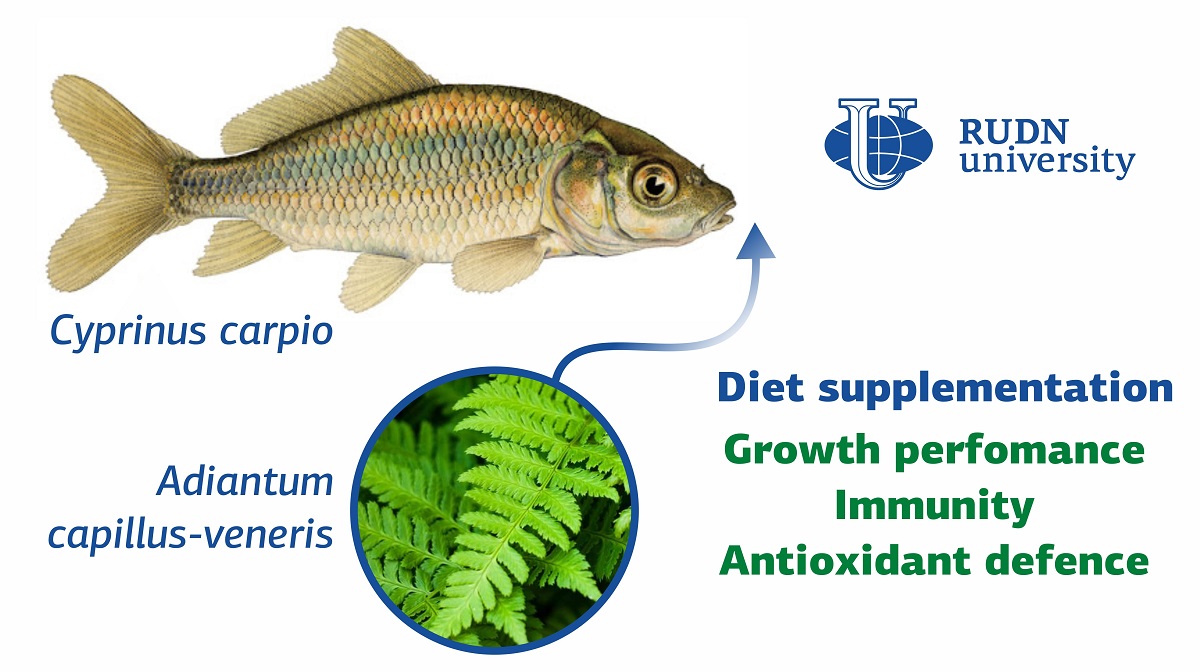RUDN University biologist: Fern leaves improve immunity and support growth in carps

Cyprinus carpio or common carp accounts for 7.7% of world fish production (around 4.2 mln tons). Because of the increasing production volumes, fish farms become overcrowded which causes stress in the fish. This, in turn, slows down their growth, weakens their immune systems, promotes infections, and eventually causes financial damage to the farmers. Infectious diseases can be fought with chemical additives, but they accumulate in the bodies of the fish leading to drug resistance in the next generations which can be harmful to consumers. A biologist from RUDN University suggested improving the immunity of the fish by adding fern leaves powder to their diet. An experiment conducted by his team confirmed the efficiency of this natural additive and showed no side effects from it.
"Many studies on the effect of plant extracts on fish have been conducted in recent years. Plant additives show positive results because they contain certain biologically active components: essential oils, alkaloids, saponins, phenols, flavonoids, and polysaccharides. In our work, we focused on Adiantum fern that has been known for its beneficial pharmacological properties since ancient times. For example, the extract of its leaves showed antibacterial activity against S. aureus and E. coli," said Morteza Yousefi, PhD., an assistant professor at the Department of Veterinary Medicine, RUDN University.
The team conducted an experiment to study the effect of Adiantum capillus-veneris on the health of fish. To do so, they distributed 144 carps between 12 pools and developed different diets (with three feedings per day) for each group. All diets were based on fish, wheat, and soy flour, fish oil, and a set of minerals and vitamins. Dried and powdered fern leaves were added to nine diets with their share varying from 0.5% to 2% of the total weight of the fodder. Then, the team monitored the growth of the fish and the activity of their immune systems for 56 days. After that, the biologists measured the levels of immunoglobulin in the blood serum and skin mucus of the fish, the activity of the antibacterial enzyme lysozyme, and other parameters.
Lysozyme activity turned out to grow with the increase of the share of fern in the diet. While the addition of 0.5% had practically no impact on the work of the enzyme, 2% made it almost twice as active, increasing its levels from 4.6 to 8 units per ml. The addition of fern powder also supported the antibacterial activity of blood serum against some pathogens, such as S. aureus, E. coli, and Ps. aeroginosa. Moreover, the fish with 2% fern powder in their diet gained the most weight: 27.7 g on average against 19.6 gained by the fish that did not receive fern at all.
"The results of our work clearly demonstrate the positive effect of Adiantum capillus-veneris on the immunity of common carp juveniles. However, further research on the molecular level is required to identify the exact mechanism of its influence on growth indicator, stress resistance, and immune parameters of the fish," added Morteza Yousefi from RUDN Univerisity.
An article about the work was published in the Fish & Shellfish Immunology journal.
Matilda Pavlovna Mityaeva was born in 1925. In November 1942, she volunteered for frontline duty. She participated in the Great Patriotic War from November 1942 to June 1945 as part of the 53rd Infantry Division of the 475th Infantry Regiment. She was wounded twice.
The team led by Sergey Zyryanov, Head of the Department of General and Clinical Pharmacology, became the winner of the All-Russian competition of scientific projects "Technologies for Human Health".
RUDN University constantly adapts to the changes of the modern world and responds to challenges flexibly. This allows us to keep the standard of a world-class research university. The sphere of science is no exception. Peter Dokukin, Head of the Research Division, presented the updated R&D Programme at the meeting of the RUDN University Academic Council.
Matilda Pavlovna Mityaeva was born in 1925. In November 1942, she volunteered for frontline duty. She participated in the Great Patriotic War from November 1942 to June 1945 as part of the 53rd Infantry Division of the 475th Infantry Regiment. She was wounded twice.
The team led by Sergey Zyryanov, Head of the Department of General and Clinical Pharmacology, became the winner of the All-Russian competition of scientific projects "Technologies for Human Health".
RUDN University constantly adapts to the changes of the modern world and responds to challenges flexibly. This allows us to keep the standard of a world-class research university. The sphere of science is no exception. Peter Dokukin, Head of the Research Division, presented the updated R&D Programme at the meeting of the RUDN University Academic Council.